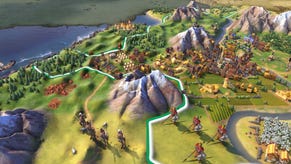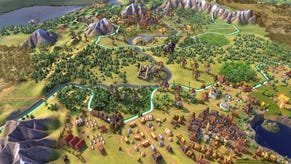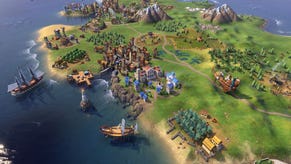Civilization 6 review
The joy of hex.
When Civilization 5 unstacked units, forcing each onto its own hexagonal tile, and doing away with the dreaded 'stack of doom' in the process, it was a huge relief. In that one neat edit Civ 5 became a clearer and more nuanced game of strategy. In Civ 6, Firaxis goes further still, unstacking the cities themselves through the introduction of districts and handing each world wonder its own tile. Where the earlier separation of units had me breathing a sigh of relief, though, the new urban sprawl of city demarcation has me hyperventilating.
There are so many more unknowns now. The themed districts that sit on tiles surrounding your city house buildings of a corresponding type: banks in the commercial district, a library on campus, barracks in the encampment and so on. Each district requires a tile of its own, comes with differing build requirements and reaps bonuses based on placement near certain terrain types, tile improvements or other districts.
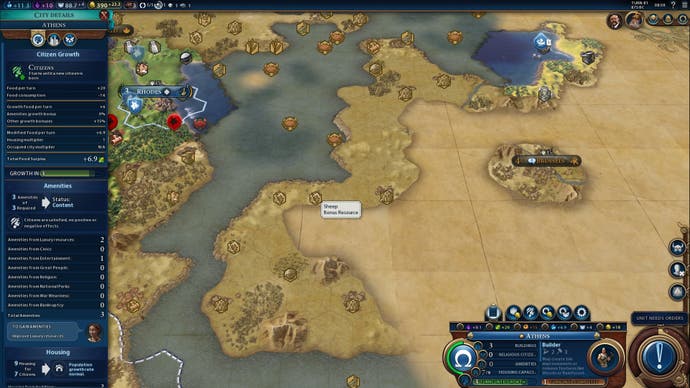
You are faced with tough choices everywhere. If a holy site can only be situated on a tile already offering a resource such as stone or bananas, should I sacrifice the resource or wait to build the holy site in another city? Should I be thinking harder about my initial city placement so as to avoid this dilemma in the first place? And how on earth am I going to house the seminal works of my great writer if I don't immediately build a theatre square to support an amphitheatre?
And breathe.
If it sounds complex it's because it is, but it's the very best kind of complexity. The challenge here isn't in the systems themselves - all introduced effortlessly and efficiently via a dedicated tutorial and the advisor system - but in the planning and strategy they enable. It's still a game about taking a handful of ancient era units and evolving and expanding upon them through the ages until a single city has turned into an empire, and until the earliest discoveries of pottery and writing have led to nuclear fission and social media. This is the same Civ at heart, but it's more adaptable and a little deeper.
It starts simply enough, with the founding of a city near a freshwater source to facilitate the basic housing system that determines your population cap. That's when the thrill of discovery kicks in. Pushing back the parchment-covered map provides a very particular type of joy, and it's here that the new art style beds itself in. Clarity is key in Civ 6's new order and, even with the resource icons switched off via the mini-map menu, map elements and resources are clearly signposted. Functionality is matched by beauty, too, the dynamic day and night conditions bathing the land in orange and purple during dawn and dusk, while the sun glints on the surface of rivers during the day. Best of all, Civ 6's relatively relaxed system requirements ensure it's a joy to behold even on modest systems and laptops.
And the music; goodness gracious the music. Civ 4's Baba Yetu is rightly lauded as the most sublime Civ theme music but Civ 6 features the most complete and consistently catchy soundtrack of any game in the series. The manner in which each civilization's signature tune riffs off a central theme and builds in complexity as the eras roll past to become more sophisticated, layered tracks is stunning. It's also telling you something as it plays - civilisation is complexity; out of one, many.
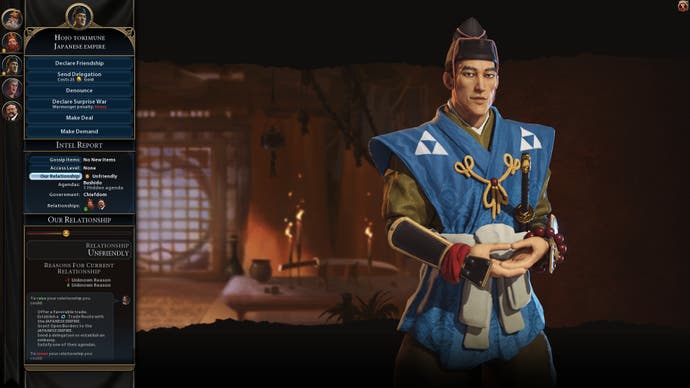
Such detailing features elsewhere, too. Buildings and districts are opened up by research of both technology and civics, one relying on science and the other on culture, thus tying the two together. It makes for a more complex game, certainly, as you work out how best to achieve your short and longer term goals - and, perhaps thankfully, it plays havoc with the starting strategy of returning players - but it's also more rewarding, refreshing and engaging for it.
The same applies to the changes to the system of governance, which are many and meaningful. Different types of policies covering military, economy and diplomacy can be swapped in and out of your overarching government type, depending on the focus and direction that you want to head in. This allows for an overarching strategy with a degree of micro-management and fine tuning during different periods of the game. Need to churn out some troops to counter a looming threat from barbarians or a rival leader? No problem, there's a policy that helps rush troop production or makes it cheaper to upgrade existing ones. Fancy having a push on wonders? The corvée policy will boost your productivity in that area and if you need to have a rush in builders to help work the land, there's an economic policy to aid with that, too. Civ 6 is extremely responsive.
The builders themselves are indicative of many of the changes that have been made to existing series systems in Civ 6, offering both a streamlined and more elegant solution to improving your land over the workers of old. Builders start with three 'charges' (although this can later be upgraded via an appropriate government policy, naturally) and each charge can be used to instantly build an improvement on a tile before the builder is used up and disappears from the map. Farms no longer take five turns to cultivate, plantations can pop-up in a moment and road placement is handled - in the early game, at least - by traders moving to and fro. It's part of Firaxis' drive to make the entire Civ experience more proactively rewarding and reduce the number of turns that you're twiddling your thumbs and waiting for something to be completed. Similarly, the research of scientific technologies and cultural civics can be boosted through actions that you take elsewhere. You'll receive a boost to research of the sailing tech if you found a city on the coast, for example. Or you'll establish the path to theology that bit sooner if you start a religion, and can research archery more quickly if you kill a barbarian with a slinger. These boosts create a tight feedback loop as you perform actions and are regularly rewarded for them.

Not all attempts to streamline its systems and interface elements have been entirely successful, however. The removal of a dedicated city screen and its replacement with a multi-page side panel, presumably to present you with a consistent view of the map at all times, has the effect of burying things away and making them slightly more fiddly to find. This is countered somewhat by a greater number of hints being found outside of the Civilopedia and in the game itself, but a single view that details every aspect of a city would still be preferable.
There's also a potential danger to the research boosting system. It becomes tempting to hold off pursuing certain techs and civics that haven't yet been boosted and for the boosts themselves to have too great an impact on the way that you choose to play. It's also possible that it could also lead to a situation in online play where there's a very specific set of conditions that could determine the perfect start. Still, the notion of prioritisation, optimised turns and a correct order of doing things is nothing new to Civ multiplayer and the additional variables at play here should at least mean that it takes a great deal longer for power-players to find that perfect route to victory.
Certainly, in my own experience, standard multiplayer games thus far have had a wonderfully random feel to them as players seek to take advantage of each of the 20 leaders' unique perks and seek out different victory types. The games themselves have been quicker thanks in part to a dedicated 'online' game speed, but each turn seems to be taking longer, presumably as players fret over where best to establish districts. The dedicated multiplayer scenarios help shake things up and are accessed by enabling the mods from the Additional Content option on the main menu. These load a pre-determined rule set and time limit based either on a number of turns or on reaching a specific era and are great for quicker, more focused play, particularly for those local multiplayer enthusiasts out there who, like me, start many a game but seldom get around to finishing them. Hotseat fans will be pleased to hear that it is included as standard this time around, meaning mini domestic skirmishes can be instigated both in game and out as you argue with your significant other about the poor sportsmanship of 'stealing' city-states from one another.
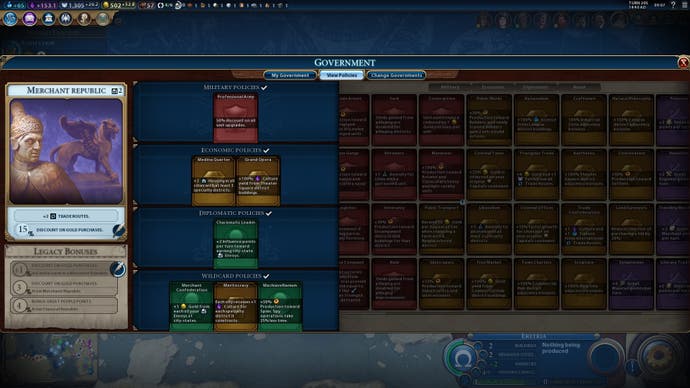
The city-states themselves have enjoyed an overhaul, incidentally. Winning favour is no longer something so crass as throwing money around to make them like you. Instead, they respond to the nation that sends them the most envoys and provide unique bonuses atop their themed ones. Influence over them no longer decays with time but you instead build upon your past relationship, trying to outdo rival leaders for the city-states' affections rather than battling the turn-ticker and your dwindling gold reserves. And speaking of rival leaders, they are no longer completely dense and unreadable. There's a great deal more information available to you to help determine what action they might take, which only gets more detailed as you send delegations, establish an embassy or send a sneaky spy in to snoop around their capital. They're still capable of moments of gross stubbornness, but trading with them has a more strategic edge to it now and they can occasionally catch you out by declaring a surprise war and pushing you on to the back foot for a dozen turns.
Of course, there's more. There's always more: new systems for Great People, Sean Bean's (generally) successful turn as narrator, the spectacle of building wonders and brilliance of the quotes that accompany research; from Plato to Pratchett and Shakespeare to Schwarzenegger. The joy of exploration and discovery is alive and well in Civ 6, and learning how the systems interact and combine is part of that fun.
Nonetheless, there is still some haziness surrounding victory conditions and how to successfully switch tactics partway through a game. In that sense, it is a game that requires multiple plays and many hours to hone successful winning strategies and understand how best to achieve certain victories. Learning how to play not only the game but also each leader and civilization is a key part of the process. Still, that won't be for everyone and some people will want to know how to do everything right off the bat.
All of which makes Civ 6 a more flexible, cohesive and complete experience than any base-game entry in the series' 25-year history. There will surely be an expansion or two but they will be building atop an already feature-rich foundation, rather than filling in gaps. Learning its systems and uncovering its secrets is a particular type of joy and dedicating time and brainpower to doing so is part of the enduring charm of a series that has, once again, refused to rest on its laurels.






